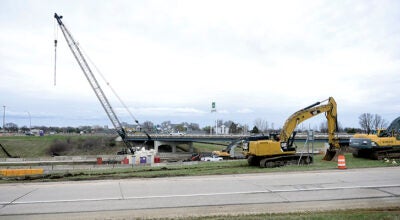Another hole opens in Vikings stadium funding plan
Published 9:31 am Wednesday, May 15, 2013
By Rachel E. Stassen-Berger and Jim Ragsdale
Minneapolis Star Tribune
ST. PAUL — First, e-pulltabs virtually collapsed as a revenue source for the state’s share of the new Vikings stadium.
Now the sports memorabilia tax, once thought to be a fallback plan, may also be doomed.
With only six days left in the legislative session, Senate leaders on Tuesday declared the idea of taxing sports memorabilia nearly dead, because of the effect it might have on a single corporation: Target.
Senate Taxes Committee Chairman Rod Skoe, DFL-Clearwater, said Tuesday that because the tax would be levied at the wholesale level, it would have a disparate impact on Target, which warehouses the sports memorabilia for its more than 1,700 U.S. stores in Minnesota.
Target Corp. officials did not return calls seeking comment.
House Taxes Committee Chairwoman Ann Lenczewski, DFL-Bloomington, is prepared to fight hard for the memorabilia tax.
“It is a workable tax,” she said, and short of getting Vikings owners to cough up more, a reasonable option. “I think the memorabilia tax is the way to go and I’m going to convince them,” she said.
Split among DFLers
That opens the newest crack among a DFL House, DFL Senate and DFL governor who, despite having struck an overall deal Sunday, have yet to resolve a number of details, including a roughly $25 million to $30 million annual gap in the state’s share of stadium financing.
The uncertainty comes a week after Gov. Mark Dayton demanded a new solution to the disappointing revenue from electronic charitable gambling. At that time, he and other leaders hinted broadly that they might have a plan. But details have been absent since then.
“We’re hearing there’s this supersecret plan to fund the shortfall in the Vikings stadium. The governor hasn’t said what it is,” said Sen. Julianne Ortman, R-Chanhassen, the ranking minority member on the Taxes Committee. “We don’t know what their plans are. It seems, six days out, they would have a better framework at least for the close of session here.”
Senate Majority Leader Tom Bakk, DFL-Cook, said he’s not worried. “I think they can find $25 million or whatever it takes” to fill in the gambling shortfall, he said.
Legislators are looking at a wide range of other solutions, including corporate taxes, income taxes or even cigarette taxes to help fund the stadium.
“It could be any one of those things,” Bakk said. “To the extent that we’re directing new money, it could be anything.”
Most of the taxes being looked at flow into the state’s general fund, which pays for education, health care, public safety and other basic needs. Tapping the general fund was considered a no-no by many legislators back when the stadium deal was struck.
“They’ve been telling us all along: ‘There’s not going to be any risk to the general fund.’ So now they’ve got to be creative,” Ortman said.
Bakk said their promise not the touch the state’s general coffers remains intact.
“Whatever money we decide would not go to the general fund today,” Bakk said, carefully defining the fund in terms of present revenue. “It’ll be new money,” he said.
Lots of decisions left
Legislators still have a lot of other decisions to make.
As leaders briefly stopped in Dayton’s office for a budget “check-in” chat Tuesday afternoon, joint House-Senate budget committees were working to button up their remaining bills.
It remains unclear how much cigarette and corporate taxes might go up, how an income tax surcharge on top earners would work or what a new top tax rate would be.
Lenczewski said her goal is to make public the details of the tax bill by midweek.
Still, legislative leaders put a happy face on all the uncertainty.
“Things are going well,” said House Majority Leader Erin Murphy, DFL-St. Paul. “People are working awfully hard to get their work done.”





